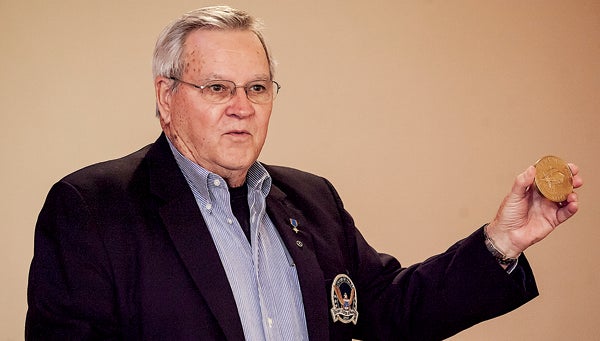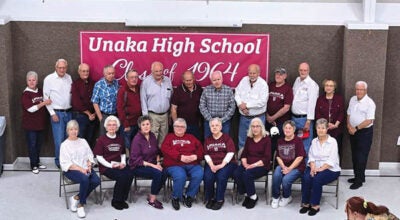Pilot’s story takes listeners to Vietnamese jungle
Published 9:33 am Thursday, October 23, 2014

Photo by Brandon Hicks
Tom Reeves, a Vietnam War Army pilot, holds a Vietnam Veterans National Medal as he tells Rotary and Kiwanis members about his experiences.
Flights over hostile jungle territory and covert military operations aren’t your typical lunchtime conversation, but during a joint luncheon meeting of the local Rotary and Kiwanis clubs, members heard stories such as those from a veteran who talked about his experiences in Vietnam.
Tom Reeves, a Nashville-area native who relocated to East Tennessee a few years ago, served in the U.S. Army for more than 30 years, including two tours in Vietnam as a pilot. Military service was a way of life in his family — his father served during World War II and his grandfather in World War I.
At the luncheon Wednesday, Reeves, a highly decorated combat veteran, pulled a metal disc from his pocket and held it up. He explained it was the Vietnam Veterans National Medal, which was struck by Congress in 1984. As he turned the medal over in his hand, Reeves said it depicted the famed Huey helicopter dropping a group of soldiers in a rice paddy. “That is what I am going to talk to you about today,” he said. Reeves then passed the medal around the room so that all in attendance could see the picture and read the words on the back of the medal: “In honor of those men and women who gave of themselves in an effort to ensure democracy and peace through the world this medal is struck.”
During college at Middle Tennessee State University, Reeves joined the Reserve Officer’s Training Corps. After college he joined the National Guard and obtained a private pilot’s license.
When the war in Vietnam began, Reeves volunteered for service as an Army pilot.
“It was my turn folks, that’s just the way it was in my family,” he said. “It was the honorable thing to do.”
Reeves said he imagined the Army camps to be similar to his experiences with the National Guard, where the soldiers had a barracks to sleep in, a place to take a shower and a mess hall for meals.
“Boy what a surprise,” Reeves said of his first encounter with military living conditions overseas. “We were living on the ground with each other. We didn’t have a shower. We might have a latrine, and then we might not.”
He compared flying helicopter missions during his first tour with being a cab driver in a major city like New York or Chicago. “You never knew from day to day what your mission would be,” he said. “Like a cab driver doesn’t know where he’s going until he picks up that fare.”
During these missions, Reeves said he and other pilots transported troops and delivered supplies between bases. He said the most dreaded missions were the “planned combat assaults” where troops would be flown into a combat area and dropped off. He said it was not uncommon for the fighting to be extremely intense and for helicopters to be called in to transport the wounded or pick up the dead.
“It was emotional,” he said. “You had to somehow keep your emotions away and remember you had to be calm and fly safely.”
Reeves said his second tour during the war was completely different. He had achieved the rank of captain during his first tour and he was approached with an offer to fly missions for Army’s intelligence division. He accepted and in May 1970 he headed back to Vietnam.
“Our mission was to fly the Ho Chi Minh Trail and pick up any movers and call it in,” Reeves said.
The special aircraft he flew had radar capability of detecting any object moving at more than 2.5 kilometers per hour, which is about 1.5 miles per hour.
Reeves said his equipment would detect the movement of boats or vehicles and he would call the location in to a command post which would then dispatch F-4 fighter planes to the area.
Reeves also worked with the LRRPs — Long Range Reconnaissance Patrols. He said those 4- to 5-man teams would be dropped off in the jungle to interdict enemies on the Ho Chi Minh Trail. Their missions would last several days and sometimes more than a week and the soldiers had to survive with only the equipment on their backs.
“These are some of the bravest men I ever met,” Reeves said of the soldiers who went on the LRRP missions.
During his second tour, Reeves said he also worked with the Central Intelligence Agency on its war efforts in the region, including flying classified missions.
“The CIA had a mercenary army fighting in Cambodia and Laos,” Reeves said, adding he once flew a mission to take a CIA operative to deliver a payment to the mercenaries. “He opened up that briefcase and it was filled with money. It was over $1 million in $20 bills of green money.”
During his time in Vietnam, Reeves said he formed a special bond with the other pilots and soldiers he served with.
“The pilots I flew with, we became like family,” he said. “We lived together. We laughed together. We trusted each other. We cried together, and some of us died together.”
Reeves received multiple commendations for his military service during Vietnam, including the Distinguished Service Cross, the Bronze Star, Legion of Merit and Joint Service Commendation Medal.



